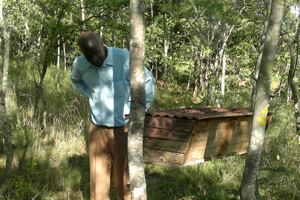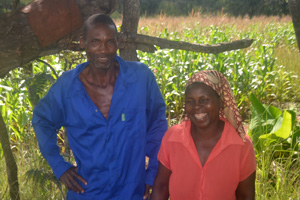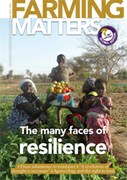One way that family farmers improve their resilience to both climatic and economic shocks is to diversify what is produced. More and different crops and livestock, particularly local varieties and breeds are being promoted. Two other options stand out too – bees and trees. These have the added advantages of complementing the production of agricultural crops and enhancing the agroecosystem. In Zimbabwe, the Ruzivo Trust has been promoting beekeeping, and the results are showing the sweet taste of success. Bees can help farmers break out of poverty.
Agriculture in Zimbabwe is largely rainfed and so highly dependent on nature and its extremes. Many families barely manage to eke out a living from the land they farm even in good years. In this context, beekeeping is one practice where families pride themselves as working with and for nature, while deriving food, nutrition and income.
At the Ruzivo Trust, we value the cultural activities of family farmers, and in our participatory approach, our resolve is not to displace but to co-create knowledge with them. Through an innovative programme we are giving family farmers the opportunity to earn a decent livelihood from their independent work in apiculture, while also providing a platform for social change.
Social learning with beekeeping
Most families now combine beekeeping with raising crops and cattle
In collaboration with district agricultural extension officers, the Ruzivo Trust identified a group of about 100 families with an enthusiasm for beekeeping in Goromonzi, and women and men were equally represented.

A little effort, well placed, can make a large contribution to improving rural livelihoods. We will use the evidence we are generating to show decision makers in government, the private sector and development agencies the value of small climate smart enterprises such as beekeeping and how these can transform lives. There is no doubt that honey production presents an enormous potential for achieving food security in Africa, and family farmers in Mazowe and Goromonzi have started towards this goal, but a journey in which their footprint will not prejudice future generations.
Bees and honey everywhere for everyone
Benefits from bees
Demand for honey and other bee products is high in Zimbabwe. Besides a food and sweetener, honey is used in making confectioneries such as Willards Foods and Crystal Sweets, in the pharmaceutical industry, and as a medicine by religious groups. There is also a strong market for beeswax for making cosmetics, antiseptics, and for floor, furniture and shoe polish. Farmers also make their own candles, wax, soap and skin lotions at the household level. Honey has health benefits, as a detoxifier, and vitamins E, D, C, and K help strengthen the body’s immune system. Honey and beeswax are also growing export commodities along with bee venom, propolis and royal jelly. These show great potential for employment generation in rural communities.
Bees also play a significant role by pollinating crops and so contributing to increased food production. Bees pollinate wild plants including forest trees and so play a priceless ecological role in biodiversity conservation and the maintenance of attractive landscapes.
There are more than 50,000 beekeepers in Zimbabwe. A field workshop arranged by the Ruzivo trust in February 2014 brought some of them together to share their knowledge on the practices and benefits of beekeeping.
Mr Moyo from Mhondoro amazed people when he told how he harvests 15 kg from each of his 15 hives every six months, or 450 kg per year. Mrs Manyowa of Mazowe was also very happy to share her experiences since she started keeping bees only a year earlier, and that she has already harvested 340 kg of honey and now has 20 hives. She says: “I strongly believe that my community must have access to honey, and the surrounding areas must have greenery where bees can thrive and people can access not just honey but also water and other resources provided by nature”.
In Mazowe, beekeeping has already helped to bind rural communities by becoming a social phenomenon where families work together to develop more sustainable farming practices.
Bees in the service of the environment
Deforestation and unregulated pesticide use are major threats to beekeeping in Zimbabwe as well as to long-term environmental sustainability in general. Today, trees and woodlands are being cut at an ever-faster rate due to demands for fuel and more land for growing input-intensive cash crops such as tobacco. The Ruzivo Trust works with family farmers to promote beekeeping-centred agroforestry, maintaining tree cover by promoting the protection and planting of trees. This also helps to ensure a regular and ample supply of bee forage, and contributes to the design of interventions that help people and their environment.
An unexpected outcome is that beekeeping increases the participation of communities in conservation. When farmers learn about the value of trees as a source of bee forage, they are also less likely to continue with destructive activities such as charcoal burning and hunting and even begin to plant more trees. They recognise that protected environments are good for bees, and the growing of bee-friendly crops like sunflower and alfalfa could further increase honey production.
Climate change, unpredictable droughts and floods are contributing to crop failures. Yet, beekeeping has proven to offer a valuable adaptation strategy. During droughts, bees can forage in the wild vegetation and still produce honey and beeswax. While farmers such as Mrs Manyowa invest in beekeeping, she is equally investing for a future environment in which her community and physical surroundings are more resilient to climate shocks. Her efforts are not lost, because in the process of conserving nature for her bees, cash is also coming into her pocket and so helping her family and her community break out of poverty.
An attractive family enterprise
Most rural development initiatives attempt to improve the farmers’ livelihoods. We have observed that when crop production alone cannot provide adequate food security, beekeeping provides a feasible diversification option. It is low cost, low risk and requires minimal land and labour, making it viable for young and old alike, and other disadvantaged groups irrespective of their socio-economic and political status.
Bees are self-sufficient and do not need constant attention. Beekeeping does not compete for resources with other types of agriculture. Most of the necessary equipment, hives, smokers, protective clothing and veils can be made by local carpenters, tinsmiths and tailors and this adds to the rural economy.
In Mazowe District, most families now practise a mix of activities combining beekeeping with raising crops and cattle. Local farmer Clemence Machoto said “I can now better cater for my growing family needs and improve my quality of life. Beekeeping supplies me with an additional non-perishable food and it is not time consuming.” A neighbour Mr Musiwo explains, “I have upgraded from using reed baskets and log hives to using improved ‘Kenyan top bar’ hives which make it easier to harvest honey without impurities”.
Beekeeping for income, pride and independence

To family farmers in Mazowe, beekeeping is becoming much more than a renewed rural occupation, but an integral part of a new and much broader agriculture with diversified income sources. A survey of 26 farmers previously trained on beekeeping by Ruzivo, showed that nine out of ten farmers improved their incomes as a result of keeping bees, diversified their diets, invested in education for themselves and their children, and reinvested in their farm to make it a more productive enterprise. Input costs are relatively low at less than 50% of the income generated, making beekeeping a thriving business that acts for many as a way out of poverty. One beehive can produce honey with a street value of almost US$100 per year, with up to 15 kg of raw honey processed into 12 kg of pure honey that is decanted into 375 g bottles and sold for US $3 each.
But is it all ‘honey’ that flows?
At the Ruzivo Trust, we have identified constraints to the further development of apiculture in Zimbabwe. Small scale farmers face uncertainties over access to finance, advice, information and reliable markets. Some beekeeping family farmers in Goromonzi district, have not yet been able to make a decent living from selling their own produce since they do not sell directly themselves and still rely on middlemen. Often, raw honey is sold to middlemen at low prices whereas pure honey and its by-products could fetch much more. Furthermore, we found that 90% of the beekeepers would benefit from improved technical knowledge at all levels of the honey value chain: in processing and value addition, record keeping and provision of coordinated market information systems.
The importance of beekeeping and its links with trade and food security must form a critical area of attention for government and international agencies, policy makers, environmentalists and entrepreneurs. We believe that beekeeping farmers have the potential to transform Zimbabwe’s agricultural sector. The challenge is a crisis of knowledge and more resources are needed to enable the necessary training and knowledge sharing, and we are confident of being able to help in covering the gap.
Chipo Gono
Chipo Gono is Program Assistant at the Ruzivo Trust, Harare, Zimbabwe.
Email: chipo@ruzivo.co.zw or visit www.ruzivo.co.zw
The author extends her heartfelt gratitude to Oxfam Novib for funding our programmes at Ruzivo Trust, the ABC community and all our partners.

